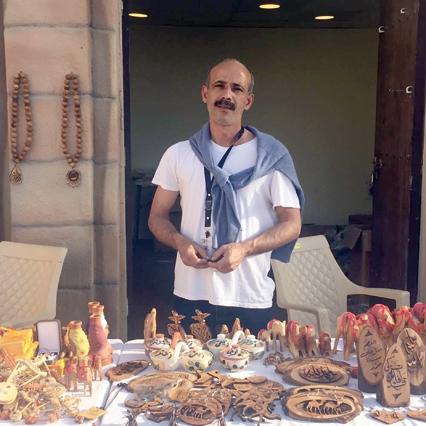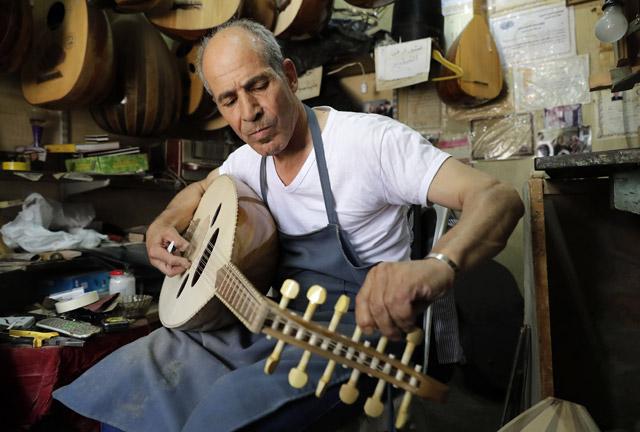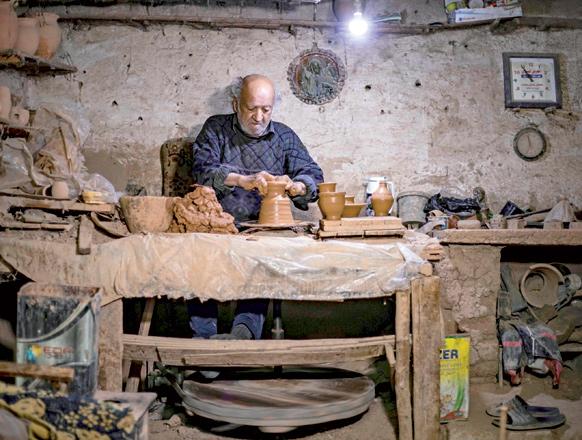You are here
‘Olive wood’ craftsman struggles to save art from extinction
By Mays Ibrahim Mustafa - Jan 15,2022 - Last updated at Jan 15,2022

Eyad Saqer poses for a photo at his workshop (Photo courtesy of Eyad Saqer)
AMMAN — Fifty-three-year-old Eyad Saqer, who is one of the last standing “olive wood” craftsmen in Jordan, is struggling to keep the craft alive.
The “olive wood” craft, which relies on recycling the remains of olive trees’ wood, has been in the region for centuries and was widespread in Jordan in the 80s.
Saqer, who has been practising the craft for over three decades, was 18 when it first caught his interest.
“I loved the possibilities of creation the olive wood offers and the idea of proving myself through something I can learn and excel at,” he told The Jordan Times.
Saqer takes pride in having learned the craft on his own.
“I used to ask people from Bethlehem, where the craft was very popular, to film videos of the making process for me, which I’d then watch repeatedly until I learned to come up with my own designs,” he said.
The items Saqer makes include souvenirs, rosaries, Christmas tree decorations, wooden spoons, plant pots, camel shapes, jewellery boxes, and beads of different shapes and sizes, among others.
Saqer had a workshop in the Hashemite Plaza, in the centre of Amman, before the government removed all shops there in 2005, as part of a plan to develop the area.
He said that “this decision adversely affected all craftsmen in the area despite the compensation we received,” noting that the craft, which is a significant part of the Jordanian heritage, lacks proper “support” to survive.
“The support I am referring to isn’t financial,” said Saqer, noting that the craft deserves more awareness and proper space to be seen and prosper.
He added that this traditional craft, not only gives people “a window into our culture” and heritage, but is also good for the environment, as it relies mainly on recycling.
“Between 1990 and 1999 the amount of wood remains I used to buy yearly was between 50-100 tonnes,” said Saqer, adding that he now only buys one or two tonnes “to pass the time with”.
Nowadays, because of the rarity of the craft, “the enormous amount of wood we used to recycle, a national treasure worth thousands of JDs, is burnt as a source of heating”, he added, noting that only three, including himself, still practise the craft in Jordan.
Saqer is one of the founders of the Handicraft Producers Association, which aims to support and preserve traditional Jordanian crafts. Today, he tries to keep the “olive wood” craft alive by passing it on to others.
“I try to hold training sessions for youth and persons with disabilities to help them build a skill and create a source of income,” he said.
Saqer also trains inmates in Jordanian prisons. He noted that “this allows them to use the craft therapeutically as a means of self-discipline”.
“I have done my part,” Saqer said, hoping that some of what he had passed on to younger generations would allow the craft to live on.
Related Articles
DAMASCUS — Antoun Tawil, one of Syria's last traditional lute makers, waits in vain in his Damascus workshop for orders of the oud, an instr
Jordan will host the fourth meeting of the board of directors of the Arab and International Relations Council on Monday and Tuesday, its chairman, Mohammad Saqer, said Saturday.
QAMISHLI, Syria (AFP) Inside a dusty and dark workshop on the banks of the Jaghjagh River in northeast Syria, Misak Antranik Petros uses an
















